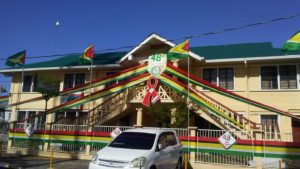
While cuts in funding from foreign organisations have hampered the drive to sensitise the public on Human Immunodeficiency Virus/Acquired Immunodeficiency Syndrome (HIV/AIDS), Government is working on innovative ways around this set back.
This is according to Public Health Minister Volda Lawrence, who explained during a recent interview with the media that this is a scenario being faced not only by Guyana but by other countries in the region. Additionally, non-governmental organisations (NGO) previously on the frontlines of spreading awareness have been hit hard.
“With regards to expanding those programmes, the programme for 2018 has been rolled out. There’s a second phase that starts very soon and that is some more public awareness. With regards what happened previously, you would not see (awareness) on that scale because it was foreign funded.”
“There was a lot of foreign funding in the Caribbean and Guyana. What is happening is not only Guyana, it’s throughout the Caribbean. The funds have dried up. So many of the NGOs who were gatekeepers no longer exist or they’re not working in a wide area as they use to do before. But the Ministry, I can assure you, we will do whatever we can with the budget we have to ensure that we come up with some new strategies.”
Asked for more details on measures to enhance public information, Lawrence noted that they have been working with the Ministries of Education and Social Protection to reach as much adolescents as possible. It has been reported that there has been a rise in new HIV cases among this group.
“We’ve been sharing thousands of condoms out there. We will continue to collaborate, not only with the sister Ministries but with NGOs. It is the responsibility of the Ministry of Public Health to ensure that we keep our population safe from any disease. And we have been doing so. With regards to the rise, it is not something new. We have been looking at the trend, since last year we saw an increase in the younger age group.”
“And we did put some other measures in place. Let me say that that number is not confirmed. And so they are working on it. Very soon they’ll be putting out the CMO (Chief Medical Officer’s) report, which has not been published for several years. I had a preliminary meeting and that’s why I can say to you those numbers had not been confirmed. I was made to understand there are some changes in the way the reporting is done now.”
HIV in Guyana
It was reported previously that Region Four (Demerara-Mahaica) had recorded the highest number of Human Immunodeficiency Virus (HIV) cases for 2017, with 650. The figures were displayed during the Pan Caribbean Partnership against HIV and AIDS (PANCAP) consultation for faith leaders, hosted at the Marriott Hotel in Kingston, Georgetown in August.
The country has also seen an overall increase in HIV cases, owing to the fact that 705 were recorded in 2015, 855 in 2016, and a whopping 961 cases were confirmed in 2017. And according to statistics presented, Region Four’s place as most populated with HIV affected persons is due to the fact that it is evidently the most populated region in the country.
Trailing Region Four was Region Three (Essequibo Islands-West Demerara), with 130 cases of HIV in 2017. For the same year, Region Eight (Potaro-Siparuni) was documented as the region with the least number of cases, since a mere three persons were diagnosed with the virus there.
Minister within the Public Health Ministry, Dr Karen Cummings had said there are many gaps in AIDS responses, which deserve some attention. The Minister had also encouraged the use of treatment, as she noted that neither HIV nor AIDS is a death sentence.
“There are still major gaps in the AIDS response, and then there are barriers that still stop people from accessing quality healthcare services. Too often, stigma and discrimination prevent people from accessing the much-needed healthcare… this situation needs to be promptly addressed, in order to ensure equitable and equal access to treatment is universal among those living with HIV,” the Minister had related.
There are a number of voluntary counselling and testing sites throughout Guyana. For those in Region four, services including treatment, are offered at the Georgetown Public Hospital and health centres around the region.



